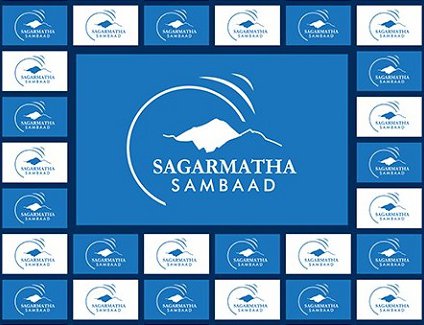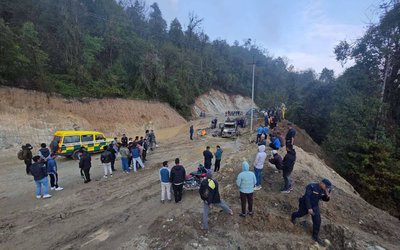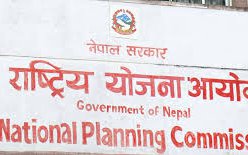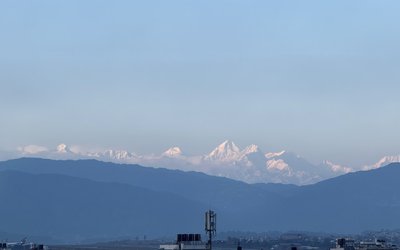
High-level initiative with an established domestic coordination mechanism to organise three-day Sagarmatha Sambad on 16-18 May 2025 is expected to draw the attention of themountain stakeholders and international communities for the protection of the mountain resources from the adverse impacts of climate change. The Government of Nepal (GoN) made a decision to organise this 'multi-stakeholder, and cross-sectoral global dialogue forum' on 'climate change, mountains and future of humanity'. The GoN has planned to organise this platform every two years.
Previously planned to be held from 2 to 4 April 2020 as per the decision of 27 January 2020, Sagarmatha Sambad was postponed due to Covid-19 through a government decision on1 March 2020.
In the recent years, glaciers around the globe are disappearing faster. About 9,000 gigatons of ice has bee estimated lost from glaciers since 1975. This loss reached to about 450 gigatons in 2024 alone. The dramatic ice loss will likely intensify economic, environmental and social challenges across the world.
Himalayas and mountains are facing multifold impacts from climate change. Glaciers are melting fast. Climate-fuelled disasters are increasing over the years and will further accelerate polycrisis as glaciers are critical source of water for drinking, agriculture production, hydropower generation and recreation, including waste management and industrial production. ICIMOD informs about 65% increase in glacier mass loss during 2010-2019 period, as compared to the precious decade.
Mountain glaciers are considered one of the largest contributors to sea level rise, targeting millions at risk. Billions of people are connected to glaciers for water security and hence, glaciers require utmost attention for early protection.
Realising the urgency for protecting the glaciers, the 2025 is observed as the International Year of Glaciers' Preservation to raise awareness about the importance of snow-capped Himalayas and fast depleting glaciers, role of glaciers in maintaining climate system and water security, and need for amplifying actions to preserve the fast-receding glaciers. The international community also observed the first World Day for Glaciers on 21 March 2025.
On 21 January 2025 - start of the International Year of Glaciers' Preservation, Right Hon. Prime Minister KP Sharma Oli announced the date to convene the Sagarmatha Sambad. The Council of Ministers decided on 03 February 2025 to organise it from 16 to 18 May 2025. To expedite the process, a 13-member Steering Committee, coordinated by the Rt. Hon. Prime Minister has been constituted for policy guidance. A Management Committee has been established under the coordination of Hon. Minister for Foreign Affairs, and Hon. Minister for Forests and Environment shall function as its co-coordinator, including a secretariat which will be coordinated by the Secretaries of the Office of the Prime Minister and the Council of Ministers, and the Ministry of Forests and Environment.
The three-day Sagarmatha Sambad will provide participants opportunities to share country perspectives, experiences and learnings, issues, concerns, ideas, priorities and required climate actions, through 4 plenaries, and 12 parallel sessions under five themes namely: (i) beyond mountains: linking mountain to ocean; (ii) green economy; (iii) averting, minimising and addressing loss and damage; (iv) climate justice and humanity; and (v) global and regional partnership.
Four plenary sessions are designed to share national and sub-national to international level experiences, practices and learning with particular focus on: (i) ecosystem services: recognition, respect and reward; (ii) climate-induced disasters: risk reduction and resilience; (iii) innovative climate and carbon financing; and (iv) Sagarmatha Sambad Declaration.
The parallel sessions will concentrate presentations and discussions around: (i) urgency of 1.50C ambition for glaciers' preservation; (ii) connecting highlands to islands; (iii) food security and climate resilience agriculture; (iv) community-led climate initiatives in the mountains; (v) powering the future: harnessing clean energy; (vi) exploring nature, culture and adventure in the mountains; (vii) mountain risk assessment and monitoring; (viii) addressing loss and damage in the mountains; (ix) sustainable cities and communities; (x) building an inclusive future: gender and inter-generational equity; (xi) bridging science and technology for mountain resilience; and (xii) sustaining mountain economy for concrete outcomes, including the next steps in addressing the adverse impacts of climate change in the mountains.
To effectively organise this event and for desired outcomes, the Steering Committee and Management Committee have met, discussed on issues and priorities. High-level engagement is expected to mobilise all possible means and resources for meaningful participation and outcomes.Meetings and consultations have been organised with the development partners, experts,and stakeholders, including a virtual meeting by the Ministry of Foreign Affairs with its diplomatic missions abroadin the recent past. Ministers and concerned government officials attending the conferences and meetings abroad have also extended invitations to relevant dignitaries. The organiser has expected participation of the Head of State or the Government from, ministers for foreign affairs and environmental ministers from mountain countries, 60 experts and panellists, and about 90 participants, representing the UN and international organisations and regional bodies. Delegates and representatives from nearly 50 countries are expected to attend this event. Newspapers mention government invitation to about 350 foreigners.
Recalling the launching of the Mountain Initiative (MI) as per the call to the mountain countries ("to come together, form a common platform and collectively raise concerns in the international arena ..) of the then Right Hon. Prime Minister at UNFCCC's CoP 15 held at Copenhagen in 2009, the government decided to organise the international conference of mountain countries on climate change on 4-5 October 2010. Nepal invited 51 countries, excluding representatives from UN and international and regional multilateral bodies, and experts. Nepal's sincere and continuous effort did not work and it was postponed due to ' low response for participation' of several mountainous countries. The government organised this international conference on 5-6 April 2012 and it adopted the Kathmandu Call for Action (KCA) which agreed, inter alia, to "give continuity to MI, organise the next conference and develop the programme of work to carry forward the KCA" (https://www.spotlightnepal.com/ 2020/02/25/sagarmatha-sambaad-towards-climate-friendly-development/).
Further recalling the experience of planned 2010 conference, our request to the then Rt. Hon. Prime Minister of Nepal in February 2012 was to ensure participation of the neighbouring countries at political level but their participation turned to bureaucratic level.
Taking note of the level of engagement in organising the event, one might hope for high-level participation in the Sagarmatha Sambad to be held in May 2025. It is mostly likely that the outcomes of the Sagarmatha Sambad may offer Nepal additional opportunities to effectively engage and include mountain agenda in the climate change negotiation processes, preferably through the UNFCCC, KP and the Paris Agreement. However, Nepal's increased gaps amongst 'doing, saying and forgetting the previous initiatives or good practices' and recent repeated concerns on 'compensation' might distract the greenhouse gas (GHG) emitters, having historical responsibilities, and new emitters to effectively participate in the Sambad at the political level and support Nepal, mountain countries and people to fight against climate change impacts.
Recalling the efforts of the then Prime Minister and UN Secretary-General in 2023 during CoP 28 at Dubai, UN Secretary-General's expression on the adverse impacts of climate change in the Nepal Himalayas both at Nepal and Dubai, and call of the Rt. Hon. President at Baku, Azerbaijan (CoP29) there is some hope for high level participation at the Sagarmatha Sambad. However, climate change negotiation has much been a political and economic issue.
Noting the state of implementation of the previous initiatives, including the 2012 Kathmandu Call for Action, let us hope that there will be a dedicated follow-up and commitment for the the implementation of the Sambad Declaration individually, jointly or collectively through collaborative efforts in a more coordinated manner. Let us also hope that the Sagarmatha Sambad will bear a "bud" that may grow-up through the climate negotiation processes for the long-term supply of delicious fruit(s), with full of energy, to the mountains, its resources and people.

Batu Uprety
Former Joint-Secretary and Chief of Climate Change Management Division, Ministry of Environment (then), and former Team Leader, National Adaptation Plan (NAP) formulation process. E-mail: upretybk@gmail.com
- Teaming up Climate Change Negotiation
- Apr 18, 2025
- Decadal Experience In Preparing The NDC
- Mar 03, 2025
- Over Five Decades Of Concern On Air Pollution
- Jan 16, 2025
- Damaging The Functional EIA Track
- Dec 22, 2024
- Baku CoP29 Outcomes And Nepal's Initiatives
- Nov 26, 2024













